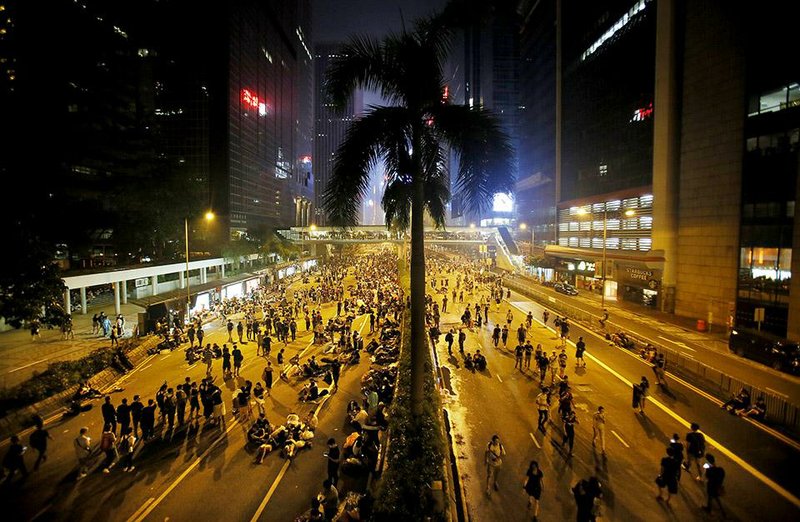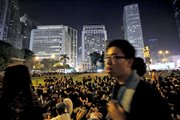HONG KONG -- Hong Kong's Beijing-selected leader called Tuesday for the pro-democracy demonstrators who have blocked major roads in the city to return home "immediately," and he gave no sign that he was prepared to compromise on their demands for more-open elections to choose his successor.
Protest leaders responded with threats to expand the demonstrations and occupy government buildings.
In his first remarks on the protests since Hong Kong police used tear gas against demonstrators Sunday, Leung Chun-ying, the semiautonomous Chinese territory's chief executive, called on one of the two main groups organizing the protests, Occupy Central With Love and Peace, to end the demonstrations.
"Occupy Central founders had said repeatedly that if the movement is getting out of control, they would call for it to stop," Leung said. "I'm now asking them to fulfill the promise they made to society and stop this campaign immediately."
Hours later, one of the protest leaders threatened larger demonstrations unless Leung met with the protesters. Addressing a growing crowd at the main protest encampment in downtown Hong Kong, Alex Chow, secretary-general of the Hong Kong Federation of Students, added that "residents may occupy various government departments" unless the government responds to their demands.
Chan Kin-man, an associate professor of sociology at the Chinese University of Hong Kong and one of Occupy Central's founders, told the protesters, "We will continue our peaceful resistance to fight for democracy, to fight for a better future for Hong Kong."
The protests, which began Friday when students took to the streets, expanded considerably when Occupy Central announced early Sunday that it was joining the demonstrations earlier than it had signaled it would.
The protesters want Beijing and the Hong Kong government to scrap a decision by China to limit who can run in the 2017 election to choose the next chief executive. China's plan for that election would let the public vote, but the candidates would be vetted by a committee friendly to Beijing.
The demonstrators also have demanded that Leung resign. He said Tuesday that until a new procedure is approved, the current method of choosing a successor by a committee dominated by Beijing's allies will continue.
Leung acknowledged Tuesday that the protests were likely to continue, and he urged the demonstrators to consider the damage he said they could do to the city.
"Occupy Central and its impact isn't a matter of days," Leung said. "It will last for a relatively long time. As a result, its impact on people's lives and their personal safety in emergencies, as well as Hong Kong's economic development and the cost to Hong Kong's international image, will grow bigger and bigger."
Long lines formed at supermarkets Tuesday as shoppers stocked up on rice and other essentials -- a sign that many residents are concerned about the possibility of a prolonged confrontation.
The police, whose use of tear gas Sunday seemed to motivate more people to join the protests, gave no indication Tuesday that they were preparing to disperse the demonstrators. Hui Chun-tak, the chief spokesman for the police, acknowledged that "the majority of protesters have expressed their views in a legal way" and praised organizers for being willing to discuss opening some lanes of the blocked roads in the city center for use by emergency vehicles.
Asked whether the police had enough personnel to clear the streets if ordered to do so, Hui responded, "I assure you, the police have enough manpower to deal with every single incident."
Information for this article was contributed by Alan Wong of The New York Times.
A Section on 10/01/2014

